世界银行采购指南_consultant_2011_1
财政部关于颁发《世界银行贷款项目国内竞争性招标采购指南》的通知
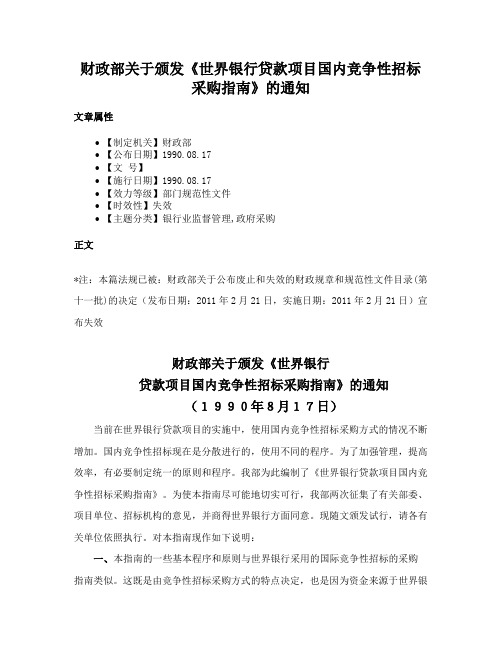
财政部关于颁发《世界银行贷款项目国内竞争性招标采购指南》的通知文章属性•【制定机关】财政部•【公布日期】1990.08.17•【文号】•【施行日期】1990.08.17•【效力等级】部门规范性文件•【时效性】失效•【主题分类】银行业监督管理,政府采购正文*注:本篇法规已被:财政部关于公布废止和失效的财政规章和规范性文件目录(第十一批)的决定(发布日期:2011年2月21日,实施日期:2011年2月21日)宣布失效财政部关于颁发《世界银行贷款项目国内竞争性招标采购指南》的通知(1990年8月17日)当前在世界银行贷款项目的实施中,使用国内竞争性招标采购方式的情况不断增加。
国内竞争性招标现在是分散进行的,使用不同的程序。
为了加强管理,提高效率,有必要制定统一的原则和程序。
我部为此编制了《世界银行贷款项目国内竞争性招标采购指南》。
为使本指南尽可能地切实可行,我部两次征集了有关部委、项目单位、招标机构的意见,并商得世界银行方面同意。
现随文颁发试行,请各有关单位依照执行。
对本指南现作如下说明:一、本指南的一些基本程序和原则与世界银行采用的国际竞争性招标的采购指南类似。
这既是由竞争性招标采购方式的特点决定,也是因为资金来源于世界银行贷款,还必须实行世界银行有关规定。
此外,这还有助于在世界银行贷款项目中扩大国内招标的比例。
二、关于采购程序和对采购决定的审查。
为了加快采购进度,提高工作效率,对于估价不超过500万元人民币的中、小型土建合同在登广告、采购决定的审查上作了进一步的简化。
世界银行对于采购决定的审查在每个项目的贷款(信贷)协定或项目协定中规定,因此,本指南中对所有需要送世界银行审查的程序都加了“如果要求的话”这样的词句,由各项目单位在具体执行时加以掌握。
三、关于招标文件的语言。
本指南中规定“招标文件使用中文。
招标文件(商务部分)的标准文本英译本经世界银行审查和认可后,将由财政部颁发”。
我部已完成货物和土建工程国内竞争性招标采购招标文件的标准文本(商务部分)初稿,正在着手修改完善。
世界银行招标采购指南
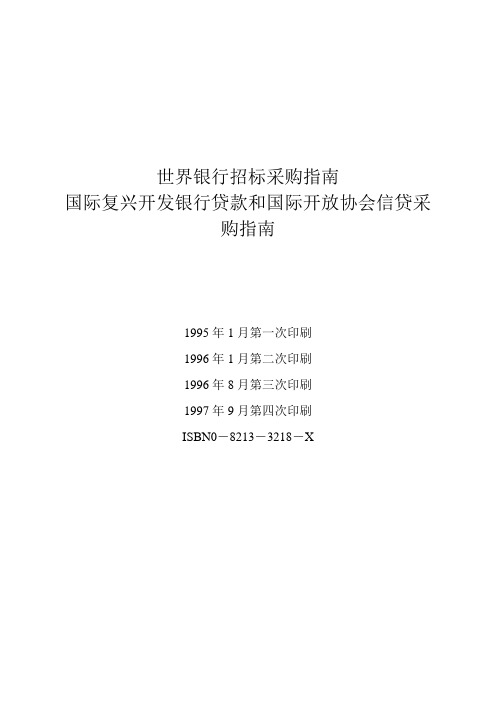
世界银行招标采购指南国际复兴开发银行贷款和国际开放协会信贷采购指南1995年1月第一次印刷1996年1月第二次印刷1996年8月第三次印刷1997年9月第四次印刷ISBN0-8213-3218-X目录一、概述 (6)1.1目的 (6)1.2一般考虑因素 (6)1.5指南的适用性 (7)1.6合格性 (7)1.8对上述例外的有: (7)1.9提前签订合同与追溯贷款 (8)1.10联营体 (8)1.11银行审查 (8)1.12保留采购 (9)1.13错误采购 (9)1.14对银行的提法 (9)1.15欺诈和腐败 (9)注释: (11)二、国际竞争性招标 (12)(一)总则 (12)2.1概述 (12)2.2合同的类型和规模 (12)2.6两步法招标 (13)2.7通告和广告 (13)2.9对投标人的资格预审 (14)(二)招标文件 (14)2.11概述 (14)2.13投标有效性和投标保证金 (15)2.15语言 (15)2.16招标文件的明晰度 (15)2.19标准 (16)2.20商标的使用 (16)2.24价格调整 (17)2.26运输和保险 (17)2.28货币规定 (18)2.29投标货币 (18)2.31为比较投标进行的货币转换 (19)2.32付款货币 (19)2.34付款条件和方法 (19)2.37合同条款 (20)2.38履约保证金 (20)2.40违约赔偿和奖励条款 (20)2.41不可抗力 (21)2.42适用法律和争端的解决 (21)(三)开标、评标和授标 (22)2.43投标书的准备时间 (22)2.44开标程序 (22)2.45对投标书的澄清或修正 (22)2.46保密性 (22)2.47投标书的检查 (23)2.48对投标的评估和比较 (23)2.54国内优惠 (24)2.56投标有效期的延长 (24)2.57对投标人的资格后审 (24)2.58授予合同 (25)2.59拒绝所有投标 (25)(四)经修改的国际竞争性招标 (25)2.63快速支付业务 (26)2.65商品的采购 (26)注释: (27)3.1总则 (29)3.2有限国际招标(LIB) (29)3.3国内竞争性招标 (29)3.5询价采购(国际和国内) (30)3.7直接采购(直采) (30)3.8自营工程 (31)3.10采购代理 (31)3.11验收代理 (31)3.12中间金融机构贷款的采购 (32)3.14由银行提供担保的贷款项下的采购 (32)3.15社区参与采购 (33)注释: (34)附录一银行对采购决定的审查 (35)1.采购计划安排 (35)2.事前审查 (35)3.合同修改 (36)4.事后审查 (36)5.翻译 (36)附录二国内优惠 (38)1.对国内制造的货物的优惠 (38)7对国内承包人的优惠 (39)附录三支付 (40)附录四投标人指南 (41)1.目的 (41)2.采购的责任 (41)3.银行的作用 (41)5.招标信息 (42)6.投标人的角色 (42)11.银行采取的行动 (43)15.汇报情况 (43)注释: (44)一、概述1.1目的本《指南》的目的,在于使项目实施人员了解有关货物和土建工程(包括相关服务)(注1)采购所应做的安排,这些安排是由国际复兴开发银行(IBRD)或国际开发协会(IDA)(注2)提供全部或部分融资。
世亚行采购指南第五章世行亚行贷款项目咨询服务采购
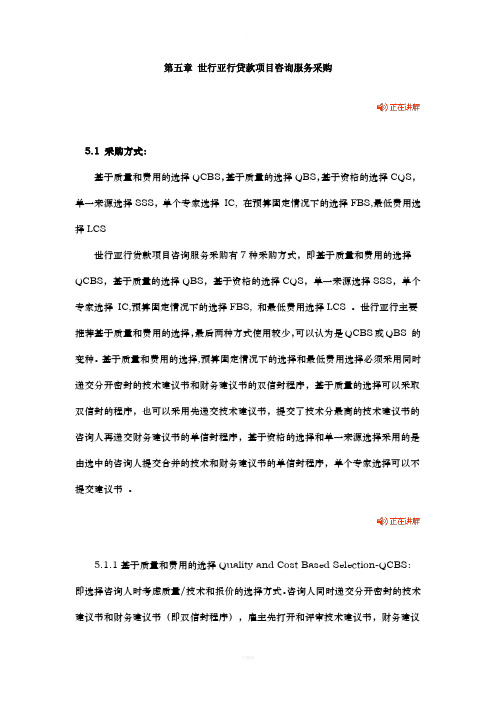
第五章世行亚行贷款项目咨询服务采购5.1 采购方式:基于质量和费用的选择QCBS,基于质量的选择QBS,基于资格的选择CQS,单一来源选择SSS,单个专家选择IC, 在预算固定情况下的选择FBS,最低费用选择LCS世行亚行贷款项目咨询服务采购有7种采购方式,即基于质量和费用的选择QCBS,基于质量的选择QBS,基于资格的选择CQS,单一来源选择SSS,单个专家选择IC,预算固定情况下的选择FBS, 和最低费用选择LCS 。
世行亚行主要推荐基于质量和费用的选择,最后两种方式使用较少,可以认为是QCBS或QBS 的变种。
基于质量和费用的选择,预算固定情况下的选择和最低费用选择必须采用同时递交分开密封的技术建议书和财务建议书的双信封程序,基于质量的选择可以采取双信封的程序,也可以采用先递交技术建议书,提交了技术分最高的技术建议书的咨询人再递交财务建议书的单信封程序,基于资格的选择和单一来源选择采用的是由选中的咨询人提交合并的技术和财务建议书的单信封程序,单个专家选择可以不提交建议书。
5.1.1基于质量和费用的选择Quality and Cost Based Selection-QCBS:即选择咨询人时考虑质量/技术和报价的选择方式。
咨询人同时递交分开密封的技术建议书和财务建议书(即双信封程序),雇主先打开和评审技术建议书,财务建议书未启封地保存在独立的机构或审计机构,目的是不然财务报价影响技术评审的公正性。
技术建议书评审完成后再打开和评审技术分合格的咨询人的财务建议书,技术分(80%)加财务分(20%)最高的咨询人中标。
世行2011年1 月的新指南规定,技术分合格的标准为75分,合同估算金额大于30万美元的合同必须采用基于质量和费用的选择或基于质量的选择。
技术分由3人以上的专家评定。
技术分不合格的咨询人的财务建议书不启封原封退回。
财务分采用最低价的建议书得100分,其他报价的建议书的得分与其报价成反比例的公式计算:即某建议书的得分=(最低报价的建议书的报价/某建议书的报价)X 100. 世行贷款项目的满分是100分,亚行贷款项目的满分是1000分。
世界银行《采购指南》
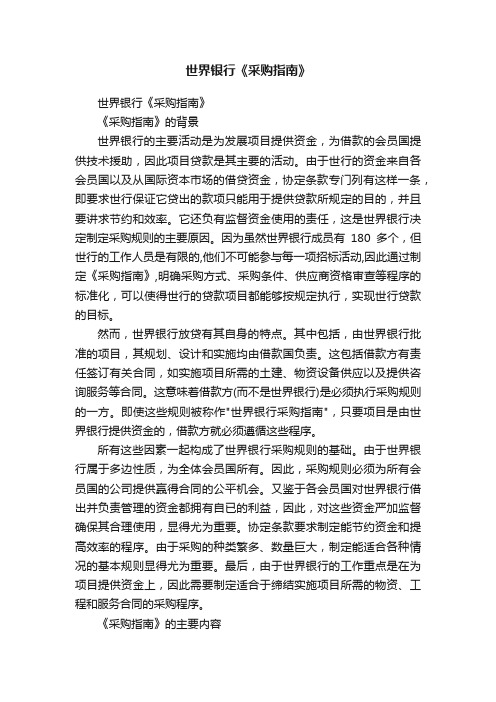
世界银行《采购指南》世界银行《采购指南》《采购指南》的背景世界银行的主要活动是为发展项目提供资金,为借款的会员国提供技术援助,因此项目贷款是其主要的活动。
由于世行的资金来自各会员国以及从国际资本市场的借贷资金,协定条款专门列有这样一条,即要求世行保证它贷出的款项只能用于提供贷款所规定的目的,并且要讲求节约和效率。
它还负有监督资金使用的责任,这是世界银行决定制定采购规则的主要原因。
因为虽然世界银行成员有180多个,但世行的工作人员是有限的,他们不可能参与每一项招标活动,因此通过制定《采购指南》,明确采购方式、采购条件、供应商资格审查等程序的标准化,可以使得世行的贷款项目都能够按规定执行,实现世行贷款的目标。
然而,世界银行放贷有其自身的特点。
其中包括,由世界银行批准的项目,其规划、设计和实施均由借款国负责。
这包括借款方有责任签订有关合同,如实施项目所需的土建、物资设备供应以及提供咨询服务等合同。
这意味着借款方(而不是世界银行)是必须执行采购规则的一方。
即使这些规则被称作"世界银行采购指南",只要项目是由世界银行提供资金的,借款方就必须遵循这些程序。
所有这些因素一起构成了世界银行采购规则的基础。
由于世界银行属于多边性质,为全体会员国所有。
因此,采购规则必须为所有会员国的公司提供赢得合同的公平机会。
又鉴于各会员国对世界银行借出并负责管理的资金都拥有自已的利益,因此,对这些资金严加监督确保其合理使用,显得尤为重要。
协定条款要求制定能节约资金和提高效率的程序。
由于采购的种类繁多、数量巨大,制定能适合各种情况的基本规则显得尤为重要。
最后,由于世界银行的工作重点是在为项目提供资金上,因此需要制定适合于缔结实施项目所需的物资、工程和服务合同的采购程序。
《采购指南》的主要内容(一)概述明确《采购指南》的目的、适用范围、投标商资格审查、世界银行的审查范围等问题,主要目的是使项目实施人员了解和利用世行贷款安排的有关货物和土建工程(包括相关服务)采购所遵循的政策和规则。
世行《咨询服务指南》(学员版)
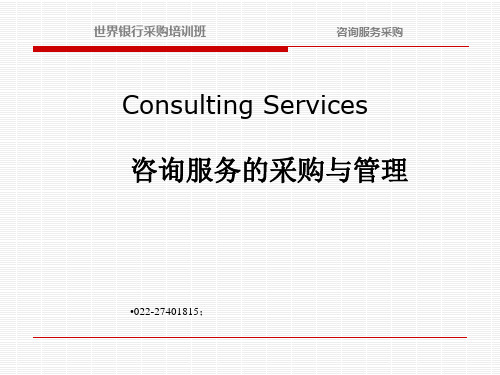
世界银行采购培训班
咨询服务采购
PROCUREMENT GUIDELINES FOR CONSULTANTS 咨询顾问采购指南
Consulting Services of 咨询服务
这些服务是根据可测量的有形产品的完成情况而进行
招标和签订合同的,并按国际复兴开发银行贷款和国 际开发协会信贷采购指南(采购之南)的规定进行采 购的。
世界银行采购培训班
咨询服务采购
Type of Consulting Services 咨询服务的类型
行业研究、招标文件、政策和策略、私有化重组、采购援助、总体规划、 可行性研究、建设监理、机构建设、培训、项目管理、设计研究、质量管 理、工程验收、管理顾问、技术顾问
补充和调整的内容
• 补充:1.9(a)和 (d)条有关利益冲突,1.19 条有关错误采购,1.23(f)有关联合国采 购,4.5 不定产出合同IDC,第五章选择单个 咨询人,附录一世行事后审查、事前审查、 制裁政策和程序,和附录二1(p)替换关 键专家。
• 调整:新老指南结构上较大的调整是把有 关公布合同授予信息的要求从老版分散于 各种采购方式集中到新版的附录一第7条。
世界银行采购培训班
咨询服务采购
Consulting Services
咨询服务的采购与管理
•022-27401815;
世界银行采购培训班
本讲的主要内容:
咨询服务采购
概述以有效的和经济的方法聘请咨询专家 所需要的活动
咨询专家的评审与选择过程
世界银行采购培训班
咨询服务采购
第一部分 世行咨询服务采购指南概述
英文版世界银行采购指南
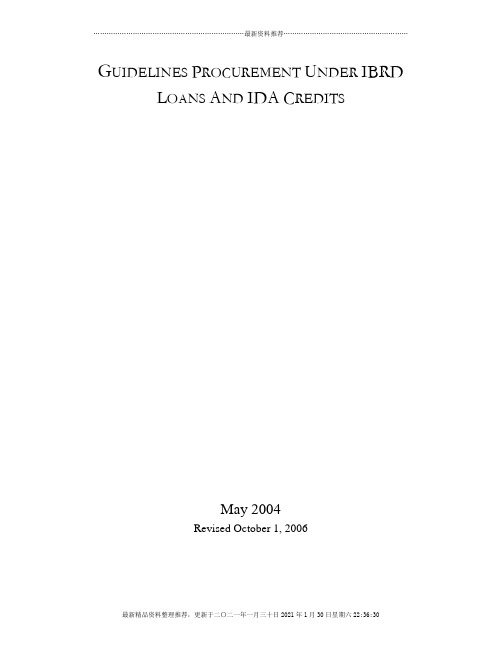
G UIDELINES P ROCUREMENT U NDER IBRDL OANS A ND IDA C REDITSMay 2004Revised October 1, 2006I. Introduction (6)1.1 Purpose (6)1.2 General Considerations (6)1.5 Applicability of Guidelines (7)1.6 Eligibility (7)1.9 Advance Contracting and Retroactive Financing (7)1.10 Joint Ventures (7)1.11 Bank Review (7)1.12 Misprocurement (7)1.13 References to Bank (7)1.14 Fraud and Corruption (7)1.16 Procurement Plan (7)II. International Competitive Bidding (7)A. General (7)2.1 Introduction (7)2.2 Type and Size of Contracts (7)2.6 Two-Stage Bidding (7)2.7 Notification and Advertising (7)2.9 Prequalification of Bidders (7)B. Bidding Documents (7)2.11 General (7)2.13 Validity of Bids and Bid Security (7)2.15 Language (7)2.16 Clarity of Bidding Documents (7)2.19 Standards (7)2.20 Use of Brand Names (7)2.21 Pricing (7)2.24 Price Adjustment (7)2.26 Transportation and Insurance (7)2.28 Currency Provisions (7)2.29 Currency of Bid (7)2.31 Currency Conversion for Bid Comparison (7)2.32 Currency of Payment (7)2.34 Terms and Methods of Payment (7)2.37 Alternative Bids (7)2.38 Conditions of Contract (7)2.39 Performance Security (7)2.41 Liquidated Damages and Bonus Clauses (7)2.42 Force Majeure (7)2.43 Applicable Law and Settlement of Disputes (7)C. Bid Opening, Evaluation, and Award of Contract (7)2.44 Time for Preparation of Bids (7)2.45 Bid Opening Procedures (7)2.46 Clarifications or Alterations of Bids (7)2.47 Confidentiality (7)2.48 Examination of Bids (7)2.49 Evaluation and Comparison of Bids (7)2.55 Domestic Preferences (7)2.57 Extension of Validity of Bids (7)2.58 Postqualification of Bidders (7)2.59 Award of Contract (7)2.60 Publication of the Award of Contract (7)2.61 Rejection of All Bids (7)2.65 Debriefing (7)D. Modified ICB (7)2.66 Operations Involving a Program of Imports (7)2.68 Procurement of Commodities (7)III. Other Methods of Procurement (7)3.1 General (7)3.2 Limited International Bidding (7)3.3 National Competitive Bidding (7)3.5 Shopping (7)3.6 Direct Contracting (7)3.8 Force Account (7)3.9 Procurement from United Nations Agencies (7)3.10 Procurement Agents (7)3.11 Inspection Agents (7)3.12 Procurement in Loans to Financial Intermediaries (7)3.13 Procurement under BOO/BOT/BOOT, Concessions and SimilarPrivate Sector Arrangements (7)3.14 Performance-Based Procurement (7)3.16 Procurement under Loans Guaranteed by the Bank (7)3.17 Community Participation in Procurement (7)Appendix 1: Review by the Bank of Procurement Decisions (7)1. Scheduling of Procurement (7)2. Prior Review (7)5. Post Review (7)Appendix 2: Domestic Preferences (7)1. Preference for Domestically Manufactured Goods (7)7. Preference for Domestic Contractors (7)Appendix 3: Guidance to Bidders (7)1. Purpose (7)2. Responsibility for Procurement (7)3. Bank’s Role (7)5. Information on Bidding (7)6. Bidder’s Role (7)10. Confidentiality (7)11. Action by the Bank (7)15.Debriefing (7)AcronymsBOO Build, own, operateBOOT Build, own, operate, transferBOT Build, operate, transferCIF Cost, Insurance, and FreightCIP Carriage and Insurance Paid (place of destination)CPT Carriage Paid To (named place of destination)DDP Delivered Duty PaidEXW Ex works, Ex factory, or Off the ShelfFCA Free Carrier (named place)GNP Gross National ProductIBRD International Bank for Reconstruction and Development (World Bank) ICB International Competitive BiddingIDA International Development AgencyLIB Limited International BiddingNCB National Competitive BiddingNGO Nongovernmental organizationPAD Project Appraisal DocumentSA Special AccountSBDs Standard Bidding DocumentsUN United NationsUNDB United Nations Development BusinessI. IntroductionPurpose1.1 The purpose of these Guidelines is to inform those carrying out a project that is financed in whole or in part by a loan from the International Bank for Reconstruction and Development (IBRD) or a credit or grant from the International Development Association (IDA),1 of the policies that govern the procurement of goods, works, and services (other than consultant services) 2 required for the project. The Loan Agreement governs the legal relationships between the Borrower and the Bank, and the Guidelines are made applicable to procurement of goods and works for the project, as provided in the agreement. The rights and obligations of the Borrower and the providers of goods and works for the project are governed by the bidding3 documents, and by the contracts signed by the Borrower with the providers of goods and works, and not by these Guidelines or the Loan Agreements. No party other than the parties to the Loan Agreement shall derive any rights therefrom or have any claim to loan proceeds. General Considerations1.2 The responsibility for the implementation of the project, and therefore for the award and administration of contracts under the project, rests with the Borrower.4 The Bank, for its part, is required by its Articles of Agreement to “ ensure that the proceeds of any loan are used only for the purposes for which the loan was granted, with due attention to considerations of economy and efficiency and without regard to political or other non-economic influences or considerations,”5 and it has established detailed procedures for this purpose. While in practice the specific procurement rules and procedures to be followed in the implementation of a project depend on the circumstances of the particular case, four considerations generally guide the Bank’s requirements:1 Procurement requirements of IBRD and IDA are identical, and references in these Guidelines to the Bank include both IBRD and IDA, and references to loans include IBRD Loans as well as IDA credits or grants and project preparation advances (PPAs). References to Loan Agreement includes Development Credit Agreement, Development Financing Agreement, Development Grant Agreement, and Project Agreement. References to “Borrower” include the recipient of an IDA Grant.2References to “goods” and “works” in these Gu idelines include related services such as transportation, insurance, installation, commissioning, training, and initial maintenance. “Goods” includes commodities, raw material, machinery, equipment, and indus trial plant. The provisions of these Guidelines also apply to services which are bid and contracted on the basis of performance of a measurable physical output, such as drilling, mapping, and similar operations. These Guidelines do not refer to Consultants’ services, to which the current Guidelines: Selection and Employment of Consultants by World Bank Borrowers apply (referred to herein as Consultant Guidelines).3For the purposes of these Guidelines, the words “bid” and “tender” shall have the same meaning.4 In some cases, the Borrower acts only as an intermediary, and the project is carried out by another agency or entity. References in these Guidelines to the Borrower include such agencies and entities, as well as Sub-Borrowers under on-lending arrangements.5The Bank’s Articles of Agreement; Article III, Section 5(b) and IDA’s Articles of Agreement; Article V, Section 1(g).(a) the need for economy and efficiency in the implementation of the project, includingthe procurement of the goods and works involved;(b) the Bank’s interest in giving all eligible bidders from developed and developingcountries 6 the same information and equal opportunity to compete in providinggoods and works financed by the Bank;(c) the Bank’s interest in encouraging the development of domestic contracting andmanufacturing industries in the borrowing country; and(d) the importance of transparency in the procurement process.1.3 Open competition is the basis for efficient public procurement. Borrowers shall select the most appropriate method for the specific procurement. In most cases, International Competitive Bidding (ICB), properly administered, and with the allowance for preferences for domestically manufactured goods and, where appropriate, for domestic contractors7 for works under prescribed conditions is the most appropriate method. In most cases, therefore, the Bank requires its Borrowers to obtain goods, works and services through ICB open to eligible suppliers and contractors.8 Section II of these Guidelines describes the procedures for ICB.1.4 Where ICB is not the most appropriate method of procurement, other methods of procurement may be used. Section III describes these other methods of procurement and the circumstances under which their application would be more appropriate. The particular methods that may be followed for procurement under a given project are provided for in the Loan Agreement. The specific contracts to be financed under the project, and their method of procurement, consistent with the Loan Agreement, are specified in the Procurement Plan as indicated in paragraph 1.16 of these Guidelines. Applicability of Guidelines1.5 The procedures outlined in these Guidelines apply to all contracts for goods and works financed in whole or in part from Bank loans.9 For the procurement of those contracts for goods and works not financed from a Bank loan, the Borrower may adopt other procedures. In such cases the Bank shall be satisfied that the procedures to be used will fulfill the Borrower’s obligations to cause the project to be carried out diligently and efficiently, and that the goods and works to be procured:(a) are of satisfactory quality and are compatible with the balance of the project;(b) will be delivered or completed in timely fashion; and(c) are priced so as not to affect adversely the economic and financial viability of theproject.Eligibility1.6 To foster competition the Bank permits firms and individuals from all countries to offer goods, works, and services for Bank-financed projects. Any conditions for6 See para. 1.6, 1.7, and 1.8.7For purposes of these Guidelines, “Contractor” refers only to a firm providing construction services.8 See para. 1.6, 1.7, and 1.8.9 This includes those cases where the Borrower employs a procurement agent under para. 3.10.participation shall be limited to those that are essential to ensure the firm’s capability to fulfill the contract in question10.1.7 In connection with any contract to be financed in whole or in part from a Bank loan, the Bank does not permit a Borrower to deny pre- or post-qualification to a firm for reasons unrelated to its capability and resources to successfully perform the contract; nor does it permit a Borrower to disqualify any bidder for such reasons. Consequently, Borrowers should carry out due diligence on the technical and financial qualifications of bidders to be assured of their capabilities in relation to the specific contract.1.8 As exceptions to the foregoing:(a) Firms of a country or goods manufactured in a country may be excluded if, (i) as amatter of law or official regulation, the Borrower’s countr y prohibits commercial relations with that country, provided that the Bank is satisfied that such exclusion does not preclude effective competition for the supply of goods or works required, or (ii) by an act of compliance with a decision of the United Nations SecurityCouncil taken under Chapter VII of the Charter of the United Nations, theBorrower’s country prohibits any import of goods from, or payments to, a particular country, person, or entity. Where the Borrower’s country prohibits payments to a particular firm or for particular goods by such an act of compliance, that firm may be excluded.(b) A firm which has been engaged by the Borrower to provide consulting services forthe preparation or implementation of a project, and any of its affiliates, shall bedisqualified from subsequently providing goods, works, or services resulting from or directly related to the firm’s consulting services for such preparation orimplementation. This provision does not apply to the various firms (consultants,contract ors, or suppliers) which together are performing the contractor’s obligations under a turnkey or design and build contract.11(c) Government-owned enterprises in the Borrower’s country may participate only ifthey can establish that they (i) are legally and financially autonomous, (ii) operate under commercial law, and (iii) are not dependent agencies of the Borrower or Sub-Borrower.12(d) A firm declared ineligible by the Bank in accordance with subparagraph (d) ofparagraph 1.14 of these Guidelines or in accordance with the World Bank GroupAnti-Corruption policies13 shall be ineligible to be awarded a Bank-financedcontract during the period of time determined by the Bank.10 The Bank permits firms and individuals from Taiwan, China, to offer goods, works, and services for Bank-financed projects.11 See para. 2.5.12 Other than Force Account units, as permitted under para. 3.8.13 For purposes of this sub-paragraph, the relevant World Bank Group Anti-Corruption policies are set forth in the Guidelines On Preventing and Combating Fraud and Corruption in Projects financed by IBRD Loans and IDA Credits and Grants, and in the Anti-corruption Guidelines for IFC, MIGA, and World Bank Guarantee Transactions.Advance Contracting and Retroactive Financing1.9 The Borrower may wish to proceed with the initial steps of procurement before signing the related Bank loan. In such cases, the procurement procedures, including advertising, shall be in accordance with the Guidelines in order for the eventual contracts to be eligible for Bank financing, and the Bank shall review the process used by the Borrower. A Borrower undertakes such advance contracting at its own risk, and any concurrence by the Bank with the procedures, documentation, or proposal for award does not commit the Bank to make a loan for the project in question. If the contract is signed, reimbursement by the Bank of any payments made by the Borrower under the contract prior to loan signing is referred to as retroactive financing and is only permitted within the limits specified in the Loan Agreement.Joint Ventures1.10 Any firm may bid independently or in joint venture confirming joint and several liability, either with domestic firms and/or with foreign firms, but the Bank does not accept conditions of bidding which require mandatory joint ventures or other forms of mandatory association between firms.Bank Review1.11 The Bank reviews the Borrower’s procurement procedures, documents, bid evaluations, award recommendations, and contracts to ensure that the procurement process is carried out in accordance with the agreed procedures. These review procedures are described in Appendix 1. The Procurement Plan approved by the Bank14 shall specify the extent to which these review procedures shall apply in respect of the different categories of goods and works to be financed, in whole or in part, from the Bank loan. Misprocurement1.12 The Bank does not finance expenditures for goods and works which have not been procured in accordance with the agreed provisions in the Loan Agreement and as further elaborated in the Procurement Plan.15 In such cases, the Bank will declare misprocurement, and it is the policy of the Bank to cancel that portion of the loan allocated to the goods and works that have been misprocured. The Bank may, in addition, exercise other remedies provided for under the Loan Agreement. Even once the contract is awarded after obtaining a “no objection” from the Bank, the Bank may still declare misprocurement if i t concludes that the “no objection” was issued on the basis of incomplete, inaccurate, or misleading information furnished by the Borrower or the terms and conditions of the contract had been modified without Bank’s approval. References to Bank1.13 If the Borrower wishes to refer to the Bank in procurement documents, the following language shall be used:14 See paragraphs 1.16.15 See paragraph 1.16.“(name of Borrower) has received (or in appropriate cases ‘has applied for’) a [loan] from the [International Bank for Re construction and Development] (the “Bank”) in an amount equivalent to USD toward the cost of (name of project), and intends to apply a portion of the proceeds of this [loan] to eligible payments under thiscontract. Payment by the Bank will be made only at the request of (name ofBorrower or designate) and upon approval by the Bank, and will be subject, in allrespects, to the terms and conditions of the [Loan] Agreement. The [Loan]Agreement prohibits a withdrawal from the [Loan] Account for the purpose of any payment to persons or entities, or for any import of goods, if such payment orimport, to the knowledge of the Bank, is prohibited by a decision of the UnitedNations Security Council taken under Chapter VII of the Charter of the UnitedNations16. No party other than (name of Borrower) shall derive any rights from the LoanAgreement or have any claim to the proceeds of the [loan].”17Fraud and Corruption1.14 It is the Bank’s policy to require that Borrowers (including beneficiaries of Bank loans), as well as bidders, suppliers, and contractors and their subcontractors under Bank-financed contracts, observe the highest standard of ethics during the procurement and execution of such contracts. 18 In pursuance of this policy, the Bank:(a) defines, for the purposes of this provision, the terms set forth below as follows:(i) “corrupt practice”19 is the offering, giving, receiving or soliciting, directly orindirectly, of anything of value to influence improperly the actions of anotherparty;(ii) “fraudulent practice”20 is any act or omission, including a misrepresentation, that knowingly or recklessly misleads, or attempts to mislead, a party toobtain a financial or other benefit or to avoid an obligation;(iii) “collusive practice”21 is an arrangement between two or more parties designed to achieve an improper purpose, including to influence improperly the actionsof another party;16IBRD’s General Conditions Applicable to Loans and Guarantee Agreements; Article V; Section 5.01 and IDA’s General Conditions Applicable to Development Credit Agreements; Article V; Section 5.0117Substitute “credit,” “International Development Association,” and “Credit Agreement,” as appropriate.18 In this context, any action taken by a bidder, supplier, contractor, or a sub-contractor to influence the procurement process or contract execution for undue advantage is improper.19For the purpose of these Guidelines, “another party” refers to a public official acting in relation to the procurement proces s or contract execution]. In this context, “public official” includes World Bank staff and employees of other organizations taking or reviewing procurement decisions.20For the purpose of these Guidelines, “party” refers to a public official; the terms “benefit” and “obligation” relate to the procurement process or contract execution; and the “act or omission” is intended to influence the procurement process or cont ract execution.21For the purpose of these Guidelines, “parties” refers to participants in the procurement process (including public officials) attempting to establish bid prices at artificial, non competitive levels.(iv) “coercive practice”22 is impairing or harming, or threatening to impair or harm, directly or indirectly, any party or the property of the party to influenceimproperly the actions of a party;(v) “obstructive practice” is(aa) deliberately destroying, falsifying, altering or concealing of evidence material to the investigation or making false statements toinvestigators in order to materially impede a Bank investigation intoallegations of a corrupt, fraudulent, coercive or collusive practice;and/or threatening, harassing or intimidating any party to prevent itfrom disclosing its knowledge of matters relevant to the investigationor from pursuing the investigation,or(bb) acts intended to materially impede the exercise of the Bank’s inspection and audit rights provided for under par. 1.14 (e) below. (b) will reject a proposal for award if it determines that the bidder recommended foraward has, directly or through an agent, engaged in corrupt, fraudulent, collusive, coercive or obstructive practices in competing for the contract in question;(c) will cancel the portion of the loan allocated to a contract if it determines at any timethat representatives of the Borrower or of a beneficiary of the loan engaged incorrupt, fraudulent, collusive, or coercive practices during the procurement or the execution of that contract, without the Borrower having taken timely andappropriate action satisfactory to the Bank to address such practices when they occur;(d) will sanction a firm or individual, including declaring ineligible, either indefinitelyor for a stated period of time, to be awarded a Bank-financed contract if it at anytime determines that the firm has, directly or through an agent, engaged in corrupt, fraudulent, collusive, coercive or obstructive practices in competing for, or inexecuting, a Bank-financed contract; and(e) will have the right to require that a provision be included in bidding documents andin contracts financed by a Bank loan, a provision be included requiring bidders,suppliers and contractors to permit the Bank to inspect their accounts and records and other documents relating to the bid submission and contract performance and to have them audited by auditors appointed by the Bank.1.15. With the specific agreement of the Bank, a Borrower may introduce, into bid forms for large contracts financed by the Bank, an undertaking of the bidder to observe, in competing for and executing a contract, the country's laws against fraud and corruption (including bribery), as listed in the bidding documents.23 The Bank will accept the22For the purpose of these Guidelines, “party” refers to a participant in the procurement process or contract execution.23As an example, such an undertaking might read as follows: “We undertake that, in competing for (and, if the award is made to us, in executing) the above contract, we will strictly observe the laws against fraud and corruption in force in the country of the [Purchaser] [Employer], as such laws have been listed by the [Purchaser] [Employer] in the bidding documents for this contract.”introduction of such undertaking at the request of the Borrowing country, provided the arrangements governing such undertaking are satisfactory to the Bank.Procurement Plan1.16. As part of the preparation of the project the Borrower shall prepare and, before loan negotiations, furnish to the Bank for its approval, a Procurement Plan24 acceptable to the Bank setting forth: (a) the particular contracts for the goods, works, and/or services required to carry out the project during the initial period of at least 18 months; (b) the proposed methods for procurement of such contracts that are permitted under the Loan Agreement, and (c) the related Bank review procedures25. The Borrower shall update the Procurement Plan annually or as needed throughout the duration of the project. The Borrower shall implement the Procurement Plan in the manner in which it has been approved by the Bank.II. International Competitive BiddingA. GeneralIntroduction2.1 The objective of International Competitive Bidding (ICB), as described in these Guidelines, is to provide all eligible prospective bidders26 with timely and adequate notification of a Borrower’s requirements and an equal opportunity to bid for the required goods and works.Type and Size of Contracts2.2 The bidding documents shall clearly state the type of contract to be entered into and contain the proposed contract provisions appropriate therefor. The most common types of contracts provide for payments on the basis of a lump sum, unit prices, reimbursable cost plus fees, or combinations thereof. Reimbursable cost contracts are acceptable to the Bank only in exceptional circumstances such as conditions of high risk or where costs cannot be determined in advance with sufficient accuracy. Such contracts shall include appropriate incentives to limit costs.2.3 The size and scope of individual contracts will depend on the magnitude, nature, and location of the project. For projects requiring a variety of goods and works, separate contracts generally are awarded for the supply and/or installation of different items of equipment and plant27 and for the works.2.4 For a project requiring similar but separate items of equipment or works, bids may be invited under alternative contract options that would attract the interest of both small24 If the Project includes the selection of consulting services, the Procurement Plan should also include the methods for selection of consulting services in accordance with the Guidelines: Selection and Employment of Consultants by World Bank Borrowers. The Bank will disclose the initial Procurement Plan to the public after the related loan has been approved; additional updates will be disclosed after the Bank has approved them.25 See Appendix 126 See para. 1.6, 1.7 and 1.8.27For purposes of these Guidelines, “plant” refers to installed equipment, a s in a production facility.and large firms, which could be allowed, at their option, to bid for individual contracts (slices) or for a group of similar contracts (package). All bids and combinations of bids shall be received by the same deadline and opened and evaluated simultaneously so as to determine the bid or combination of bids offering the lowest evaluated cost to the Borrower.282.5 In certain cases the Bank may accept or require a turnkey contract under which the design and engineering, the supply and installation of equipment, and the construction of a complete facility or works are provided under one contract. Alternatively, the Borrower may remain responsible for the design and engineering, and invite bids for a single responsibility contract for the supply and installation of all goods and works required for the project component. Design and build, and management contracting29 contracts are also acceptable where appropriate.30Two-Stage Bidding2.6 In the case of turnkey contracts or contracts for large complex facilities or works ofa special nature or complex information and communication technology, it may be undesirable or impractical to prepare complete technical specifications in advance. In such a case, a two-stage bidding procedure may be used, under which first unpriced technical proposals on the basis of a conceptual design or performance specifications are invited, subject to technical as well as commercial clarifications and adjustments, to be followed by amended bidding documents31 and the submission of final technical proposals and priced bids in the second stage.Notification and Advertising2.7 Timely notification of bidding opportunities is essential in competitive bidding. For projects that include ICB the Borrower is required to prepare and submit to the Bank a draft General Procurement Notice. The Bank will arrange for its publication in UN Development Business online(UNDB online) and in the Development Gatewa y’s dgMarket).32 The Notice shall contain information concerning the Borrower (or prospective Borrower), amount and purpose of the loan, scope of procurement under ICB, and the name, telephone (or fax) number, and address of the Borrower’s agency responsible for procurement and the address of the Website where specific procurement notices will be posted. If known, the scheduled date for availability of prequalification or bidding documents should be indicated. The related prequalification or bidding28 See paras. 2.49 2.54 for the bid evaluation procedures.29 In construction, a management contractor usually does not perform the work directly but contracts out and manages the work of other contractors, taking on the full responsibility and risk for price, quality, and timely performance. Conversely, a construction manager is a consultant for, or agent of, the Borrower, but does not take on such risks. (If financed by the Bank, the services of the construction manager should be procured under the Consultant Guidelines. See footnote 2.)30 Also see paras. 3.14 and 3.15 for performance-based contracting.31In revising the bidding documents in the second stage the Borrower should respect the confidentiality of the bidders’ technic al proposals used in the first stage, consistent with requirements of transparency and intellectual property rights.32 UNDB is a publication of the United Nations. Subscription information is available from: Development Business, United Nations, GCPO Box 5850, New York, NY 10163-5850, USA (Website: ; e-mail: dbsubscribe@); Development Gateway Market is an electronic portal of Development Gateway Foundation, 1889 F Street, N.W. Washington, DC 20006, USA (Website: ).。
国内评标与《世界银行采购指南》评标方法的对比及分析
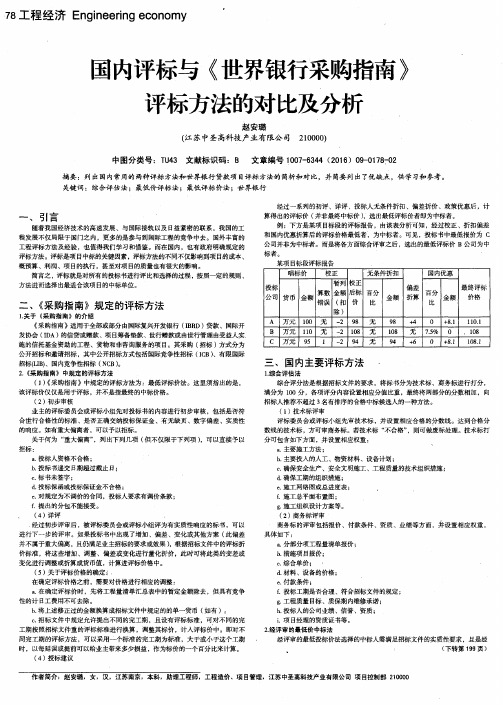
7 8 工程经济 E n g i n e e r i n g e c o n o my
公司 货币 金 额 算数 金额 后标 百分 金额 折算 百分 金额 价格
二、《 采购指 南》规定 的评标方法
1 . 关于 《 采购指南》的介绍
比
比
《 采购指南 》适用于全部 或部分由国际复兴开发银行 ( I B R D) 贷款 、国际开 发协会 ( I D A) 的信贷或赠款 、 项目 筹备垫款 、世行赠款或由世行管理 由受益人实
国内评标与 《 世界银行采购指南 》
评标方法的对 比及分析
赵 安璐
( 江苏 中圣高科技产业有 限公 司 2 1 0 0 0 0 ) 中图分类号 :T U 4 3 文献标识码:B 文章编号 1 0 0 7 - 6 3 4 4( 2 0 1 6 )0 9 - 0 1 7 8 7 0 2
程 发展不仅局限于 国门之 内,更 多的是参 与到国际工程的竞争中去 。国外丰富 的 工程评标方法及经验 ,也值得我们学 习和借鉴。而在国内 ,也有政府 明确规定 的 评标 方法。评标是项 目中标的关键因素 , 评标方法的不同不仅影响到项 目的成 本、 概预算 、利润 、项 目的执行 ,甚至对项 目的质量也有很大的影响。 简言之 , 评标就是对所有的投标书进行评 比和选择 的过程 ,按照一定的规则、 方 法进而选 择出最适 合该项 目的中标单位 。
经过初步评审后 ,被评标委 员会 或评 标小组评为有实质性响应 的标书 ,可 以 进行下一步 的评 审。如果投标 书中出现了增加 、偏差 、变化或其他方案 ( 此偏差 并不属于重大偏离 , 且仍满足业主招标的要求或效果 ) ,根据招标文件中的评标折 价标准 ,将这些增加 、调整 、偏差或变化进行量化折价 ,此时可将此类 的变差或 变化进行调整或折算成货 币值 ,计算进评标价格 中。 ( 5 ) 关 于评标价格 的确定 在确定评标价格之前 ,需要对价格进行 相应的调整 :
(采购管理)世界银行采购指南

国际复兴开发银行贷款和国际开发协会信贷与赠款世界银行借款人货物、工程和非咨询服务采购指南58668Pu bli c Di scl os ur e Au th ori ze dPu bli c Di scl os ur e Au th ori ze d2011年1月2011年版权所有国家复兴开发银行/世界银行美国华盛顿特区西北区H街1818号邮政编码:204332011年1月2012年3月第一次印刷本文为世界银行2011年1月出版的《世界银行借款人货物、工程和非咨询服务采购指南》的中译文,仅供参考。
中译文如有与英文不一致之处,请以英文为准。
一、概述................................................................ .. (1)1.1目的..................................................................................................................................... (1)1.2一般考虑因素..................................................................................................................................... (1)1.5指南的适用性....................................................................................................................................... (2)1.6利益冲突............................................................................................................................... (2)1.8合格性..................................................................................................................................... (3)1.11提前签订合同与追溯贷款......................................................... 3 1.12联营体..................................................................................................................................... (3)1.13世行的审 (4)1.14错误采购.................................................................................................................................................... 4 1.15 对世行的提法.................................................................................................................................... (4)1.16欺诈和腐败........................................................................................................................................... (4)1.18.... 6 二、国际竞争性招标................................................................ . (7)( - ) 总则........................................................................................................................................... (7)2.1概述...................................................................................................................................... (7)2.2合同的类型和规模.................................................................7 2.6 两阶段招标..................................................................................................................................... (7)2.7招标通知和公告....................................................................................................................................82.9对投标人的资格预审 (8)( 二) 招标文件................................................................................................................................................................ 9 2.11 总则..................................................................................................................................... (9)2.13投标有效期和投标保证金 (9)2.15 语 (9)2.16招标文件的明晰性.....................................................................................................................................10 2.19 标准.................................................................................................................................... (10)2.20品牌的使用.................................................................................................................................. (10)2.21 报价................................................................................................................................................ 11 2.24调价.................................................................................................................................. (11)2.26 运输和保险 .............................................................................................................................................11 2.28货币规士.......12 2.29 投标货币 .......................................................................................................................................... (12)2.31为比较投标价格进行的货币转换 (12)2.32付款货币.................................................................................................................................. (13)2.34 付款条件和方法 (13)2.37 备选方案投标 .........................................................................................................................................13 2.38合同条款 ...................................................................................................................................... (13)2.39履约保证金和保留金 (13)2.41罚款和奖励条款.............................................................................................................................. ..142.42不可抗力............................................................................................................................... (14)2.43适用的法律和争端的解决................................................................................................................... 14 (三)开标、评标和授标.................................................................142.44投标书的准备时间.................................................................142.45开标程序.................................................................................................................................... (14)2.46对投标书的澄清或修正...........................................................1 52.47保密性.................................................................................................................................... (15)2.48投标书的核查.............................................................................................................................. (15)2.49对投标书的评审和比2.50 1 (5)2.55国内优惠..............................................................................................................................16 .............................................. 2.57投标有效期的延长.......................................... (16)2.58对投标人的资格后审............................................................. 1 62.59授标................................................................................................................................... ............ 16 2.60 公示授标结果.................................................................................................................................... . (16)2.61所有投标被废标 (17)2.65废标原因通报会 (17)(四)简化的国际竞争性招标............................ 17 2.66单纯进口.................................................................................................................................... (17)2.68农产品和矿产品的采购....................................................................................................................... 1s、其它采购方式................................................................................................................................... . (19)3.1总则..................................................................................................................................................... 19 3.2 有限国际招标....................................................................................................................................193.3国内竞争性招标....................................................................................................................................193.5询价采购............................................................................................................................... (20)3.6框架协议............................................................................................................................... (20)3.7直采........................................................................................................................................................ 20 3.9 自营............................................................................................................................... (21)3.10从联合国机构采购................................................................................................................................ 2 13.11采购代理和代建方 (22)3.12商检代理............................................................................................................................... (22)3.13向中间金融机构和实体提供贷款的采购22 3.14 公私合作模式的采购 ............................................................................................................................23 3.16 基于结果的采购 .............................................................................................................................. (23)23.18世行提供担保的贷款项下的采购 (24)23.19社区参与的采购 (24)23.20米用借款国自己的采购程序............................................................................................................. 24附录一\世行对采购的审查以及授标公示 (25)1.采购计划与安排..........................................................................................................................................252.事前审查........................................................................................................................................ (25)5.事后审查........................................................................................................................................... (26)6.从事后审查变为事前审查 (26)7. 公示授标结果........................................................................................................................................... (26)8.对被世行制裁的公司或个人参加投标或正在履行现有合同的处理办法26 附录二:国内优惠............................................................. (28)1.对于国内制造货物的优惠 (28)8.对国内承包商的优惠 (29)录三:投标人指南................................................................ (30)1.目的........................................................................................................................................ (30)2.采购的责任方........................................................................................................................................ (30)3.世行的角色 ....................................................................................................................................... (30)5.招标标讯........................................................................................................................................ (30)6.投标人的角色........................................................................................................................................ (30)10.保密性...................................................................................................................................... (31)11.世行采取的行动.......................................................................................................................................3115. 废标情况通报会 (33)缩写词英文全称Build, own, operateBuild, own, operate, transferBuild, own, transferCommunity Driven Development Cost, Insurance, and Freight Carriage and InsurancePaid (place of destination) Carriage Paid to (named place of destination)Delivered Duty PaidEx works, Ex factory, or Off the Shelf Framework AgreementsFree Carrier (named place) Fiduciary Principles Accord Gross National ProductInternational Bank for Reconstruction and Development (World Bank)International Competitive Bidding International Chamber of Commerce英文缩写BOO BOOTBOT CDD CIFCIPCPT DDP EXW FA FCA FPA GNP IBRD ICB ICC中文全称 建设-拥有-经营 建设-拥有-经营 —转让建设-拥有-转让 社区主导型发展 到岸价运费及保险费付至 (目的地) 运费付至 (指定目的地) 完税后交货 工厂交货价 框架协议货交承运人(指定地 点)信用原则协议 国民生产总值 国际复兴开发银行 (世界银行) 国际竞争性招标 国际商会International Centre for Settlement of 解决投资争端国际 Investment Disputes中心International Development Association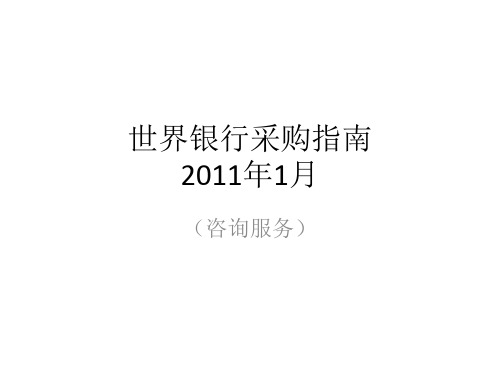
新版的其他修改
• 新版的其他修改有内容的精简,(如1.25 条对 采购计划的要求)和文字或简称的明确,如新 版明确定义了感兴趣函(意向书)EOI和感兴 趣函(意向书)征求广告 REOI。 • 新指南的封面增加了“分类:公共部门 Classification: Public”的字样,说明指南适用 于公共部门采购,私营部门采购可以有不同的 规定。 • 首字母缩略词增加了EOI 表示感兴趣函, REOI 征求感兴趣函文件,IDC 任务不确定合同, UCS 使用国家系统。
利益冲突
• 1.9(a),借款人委托为项目提供货物、工程和 非咨询服务(本指南规定之外的其他服务) 的公司及其附属公司没有资格提供与这些 货物、工程和非咨询服务直接有关的咨询 服务。这些附属公司直接或间接由该公司 控制,或控制该公司,或者共同由该公司 控制。本规定不适用于在交钥匙或设计建 造合同下承担义务的各种公司(咨询人、 承包商或供应商)
• (a) 该合同未按贷款协定和世界银行不反对 的采购计划中的程序选聘咨询人, (b) 借 款人故意拖延或采取其它不合理行动使得 一个成功的合同延误不能授予,或者使得 成功的建议书无效,或者错误地拒绝任何 建议书;或者 (c) 借款人代表或贷款资金 的任何接受人参与1.23(c) 条所述的腐败和 欺诈活动。在这种情况下,无论是事前审 查或事后审查,世界银行将宣布其为错误 采购
其他重要修改和补充:
• 迟到的感兴趣函EOI不能简单地拒绝(2.5条), 常规以时间为基础的合同的人月数不得修改 (2.11和2.33条),公开开启技术建议书 (2.13 条),技术及格分为70-85(2.17条), 评委独立评分和对同一咨询人差别大的技术分 需要解释,(2.22条),总价包干的合同的建 议书计算错误不修正和报价不含非直接税 (2.24条),评审价可以含税 (2.25条),终 止合同谈判前提前通知咨询人(2.30),脚注 42条,在CQS方式下只有选中的公司提交建议 书,合同谈判记录由双方签字 (3.7条)
世界银行诚信合规指南与采购规则

世界银行诚信合规指南与采购规则下载提示:该文档是本店铺精心编制而成的,希望大家下载后,能够帮助大家解决实际问题。
文档下载后可定制修改,请根据实际需要进行调整和使用,谢谢!本店铺为大家提供各种类型的实用资料,如教育随笔、日记赏析、句子摘抄、古诗大全、经典美文、话题作文、工作总结、词语解析、文案摘录、其他资料等等,想了解不同资料格式和写法,敬请关注!Download tips: This document is carefully compiled by this editor. I hope that after you download it, it can help you solve practical problems. The document can be customized and modified after downloading, please adjust and use it according to actual needs, thank you! In addition, this shop provides you with various types of practical materials, such as educational essays, diary appreciation, sentence excerpts, ancient poems, classic articles, topic composition, work summary, word parsing, copy excerpts, other materials and so on, want to know different data formats and writing methods, please pay attention!第一部分:引言。
世界银行作为国际金融机构,在全球范围内提供资金和支持,以帮助发展中国家实现经济增长和减少贫困。
世界银行采购指南

世界银行的?采购指南?国际复兴开发银行贷款和国际开发协会信贷采购指南(1995年1月)一、概述目的1.1 本?指南?的目的,在于使那些负责实施由国际复兴开发银行(简称银行)或国际开发协会(简称协会)提供货款予以局部或全部资助的工程的人员,了解在采购工程所需的货物和工程(包括有关效劳)时所应作出的安排。
贷款协定决定了借款人和银行间的法律关系,本指南适用于在协定所规定的范围内该工程中的货物和工程的采购。
借款人和为工程提供货物和工程的供给商的权利和义务,取决于招标文件及借款人和货物与工程的供给商之间所签订的合同,而不是取决于本指南或贷款协定的规定。
除贷款协定的双方外,任何第三者不得从贷款协定中分享任何权利或对贷款资金提出任何要求。
一般考虑因素1.2 借款人负责工程的执行,因此也负有授予合同和管理合同的责任。
银行的协定条款要求银行"确保任何一笔贷款资金只能用于提供贷款的既定目的上,并充分考虑经济和效率,而不应涉及政治或其它非经济因素的影响或考虑",并且银行为此而制定了详细的程序。
实际上,工程实施所应遵循的具体采购规那么和程序,要根据具体工程的情况而确定。
一般要考虑以下四个方面:(a)在工程实施中,必须注意经济性和有效性,包括货物和工程的采购。
(b)银行作为一个合作性机构,愿意对兴旺国家和开展中国家的所有合格投标商在银行资助的工程中提供货物和工程给予竞争的时机。
(c)银行作为一个开发机构,愿意促进借款国本国的承包业和制造业的开展。
(d)采购过程透明度的重要性。
1.3 银行认为,在大多数情况下,这些要求和意愿可以通过管理得当的、并且适当允许按照事先规定的条件给予国内制造的货物和土建工程和国内承包商以优惠的国际竞争性招标得以充分实现。
因此,在这种情况下,银行要求其借款人采取国际竞争性招标方式邀请合格的供货商和承包商参加投标来采购货物和工程8。
本指南第二章描述了国际竞争性招标的程序。
1.4 另一方面,在有些情况下,国际竞争性招标显然不是最经济和有效的采购方式,而采用贷款协定中规定的其它采购方式那么更为经济有效。
世行采购指南

世行采购指南(总36页)本页仅作为文档封面,使用时可以删除This document is for reference only-rar21year.March国际复兴开发银行贷款和国际开发协会信贷采购指南2004年5月2006年10月修改国际复兴开发银行贷款和国际开发协会信贷采购指南2004年版权所有国际复兴开发银行/世界银行美国华盛顿特区西北区H街1818号邮政编码:204332004年4月第一次印刷世界银行版权所有ISBN 0-8213-5829-4说明本文为世界银行2004年5月出版,2006年8月1日修改的《国际复兴开发银行贷款和国际开发协会信贷采购指南》的中译文,仅供参考。
中译文中如有与英文不一致之处,请以英文为准。
2006年10月修改版主要涉及合格性和欺诈与腐败条款的修改,修改处已用黑色斜体标出。
目录一、概述 ........................................................................................................................ 错误!未定义书签。
目的............................................................................................................... 错误!未定义书签。
一般考虑因素............................................................................................... 错误!未定义书签。
指南的适用性............................................................................................... 错误!未定义书签。
- 1、下载文档前请自行甄别文档内容的完整性,平台不提供额外的编辑、内容补充、找答案等附加服务。
- 2、"仅部分预览"的文档,不可在线预览部分如存在完整性等问题,可反馈申请退款(可完整预览的文档不适用该条件!)。
- 3、如文档侵犯您的权益,请联系客服反馈,我们会尽快为您处理(人工客服工作时间:9:00-18:30)。
合格性 1.12
• 在世行提供全部或部分贷款的合同中,世 行不允许借款人用与下属理由无关的原因 拒绝咨询人进入短名单,或进入选择程序, 或被授予咨询服务合同:(1) 成功地履行合 同的能力和资源;或(2) 上述1.9条所述的利 益冲突。
1.13 (b), 1.13 (c):
• 1.13 (b)借款国政府拥有的企业或机构只有在能够 证明其(i)在法律上和财务上是独立的, (ii)按照商业 法运营, 并且(iii)与项目借款人或子借款人独立的情 况下才能参与为提供该项目下的咨询服务提交建议 书。 • 1.13 (c): 作为上述(b)的例外:当借款国国有的 大学或研究中心或其它机构是仅有的和独特的,包 括缺少适当的私营部门的替代方案,而这些大学或 研究中心的参与对项目的实施极其关键,世界银行 可以个别地同意聘用这些大学或研究中心。以此类 似,世界银行贷款项目也可以个别地聘用大学教授 或研究所的科学家。
二、基于质量和费用的选择(QCBS)
• • • • • • • • • • •
2.2
选择过程应包括以下步骤:
(a) 准备任务大纲(TOR) (b) 准备费用估算及预算,短名单选择标准 (c) 登广告 (d) 准备咨询人短名单 (e) 准备并发出建议书征询文件(RFP)-包括邀请信(LOI) -咨询人须知(ITC)-任务大纲TOR-建议的合同草案 (f) 收到建议书 (g) 评审技术建议书:考虑质量 (h) 公开开启财务建议书 (i) 评审财务建议书 (j) 最终评审质量和价格 (k) 谈判并对选定的公司授予合同。
1.25 采购计划:
• 为项目编制现实的采购计划是成功监督和实施项目 的关键。作为项目准备的一部分,借款人应该为全 项目编制一份初步的临时的的采购计划对项目实施 的头18个月将选择的公司和个人,借款人应该编 制包括全部合同的详细的和全面的采购计划, 最迟 在项目谈判时应该取得世界银行的同意。借款人应 该在项目实施期间每年或按照需要更新采购计划, 包括之前授予的合同和未来12个月要采购的合同。 全部采购计划及其更新和修改在实施之前应该获得 世行的事前审查和不反对意见。贷款谈判后,世行 将在其外部网站上公开同意的初步采购计划及其提 供了不反对意见后的全部后续更新。
1.8
• 指南的原则、规定和程序适用于全部和部 分由世行贷款的咨询服务合同。借款人可 以使用其它法规和程序采购上述资金之外 的合同,这些合同包含在贷款协议规定的 合同范围内。在这种情况下,世行必须满 意:(a)采用的程序选择的咨询人有要求 的资格,借款人勤奋地和有效地实施了项 目;(b)选择的咨询人按照同意的进度完 成任务;(c)服务的范围与项目的需要一 致。
利益冲突
• 1.9(a),借款人委托为项目提供货物、工程和 非咨询服务(本指南规定之外的其他服务) 的公司及其附属公司没有资格提供与这些 货物、工程和非咨询服务直接有关的咨询 服务。这些附属公司直接或间接由该公司 控制,或控制该公司,或者共同由该公司 控制。本规定不适用于在交钥匙或设计建 造合同下承担义务的各种公司(咨询人、 承包商或供应商)
2004年5月,2006年10月修改版
• 世界银行借款人选择 和雇 用咨询人指南 • GUIDELINES • Selection and Employment of BY WORLD BANK BORROWERS • May 2004, Revised October 2006
完全新增加的内容
• 2011年1月版修改完全新增加的内容有3.12 条使用国家系统,3.14 条世行贷款担保选 择咨询人,4.10条误期赔偿,和附录一第6 条 “从事后审查变为事前审查”。
补充和调整的内容
• 补充:1.9(a)和 (d)条有关利益冲突,1.19 条有关错误采购,1.23(f)有关联合国采 购,4.5 不定产出合同IDC,第五章选择单个 咨询人,附录一世行事后审查、事前审查、 制裁政策和程序,和附录二1(p)替换关 键专家。 • 调整:新老指南结构上较大的调整是把有 关公布合同授予信息的要求从老版分散于 各种采购方式集中到新版的附录一第7条。
其他重要修改和补充(续):
• 预付款保证金(4.8条),公司提供单个咨 询人(5.1条),鼓励为单个咨询人选择刊 登广告,公司经验不考虑,可以与公司签 订单个咨询人合同(5.2,5.3,5.5条,建议 书有效期延长超过4周要世行事前审查, (附录一2(d))合同谈判记录要世行事 前审查,(附录一2(f)), 评委打分记录 保存至贷款关账后2年,(附录一2(k)) 合同谈判后2周之内公布中标信息 (附录二 第7条)。
1.13 (d):
• 借款国政府官员或公务员只有在以下情况 下可以以单个咨询人或作为某咨询公司的 专家成员被借款国聘用提供咨询服务,条 件是这种聘用与其他雇佣或其它法律法规 或借款国的其它政策不冲突:(i) 不带薪休 假,或辞职,或退休,(ii) 在休假、辞职或 退休前没有被事先工作的机构聘用
1.19 错误采购:
• 采购指南第一章的规定适用于指南的其它章节
指南的适用范围
• 1.7 适用咨询服务采购指南的咨询服务指 知识性的和咨询性的服务。咨询服务指南 不适用于其它以物质方面占主导地位的服 务(例如土建施工,货物制造,设施或工 厂的运营和维护,测量,勘探钻井,航空 摄影和卫星遥测,以可以计量的实物产出 为基础的运行服务),这些服务的标准可 以明确定义和一致性地运用。
1.4 一般考虑:
• 以下五个主要方面的考虑指导着世界银行在选 择程序方面的政策: • (a) 需要高质量的服务; • (b) 需要有经济性和效率性; • (c) 需要给来自所有合格的咨询人在提供由世 界银行资助的服务中一个进行竞争的机会。 • (d) 世界银行鼓励其发展中国家会员国发展本 国咨询业和使用本国咨询人。 • (e) 选择过程透明度的需要。
2.4 费用估算:
• 费用估算应以借款人对完成这项工作所需 资源的估价为依据,即:工时,后勤保障, 及物质投入(如车辆,实验室设备等)。 费用应分为两大类:(a)服务费或报酬(根 据所使用合同的类型)(b)可报销费用,还 可再分为国外和国内费用。建议书征求文 件应该指明估计的专家投入时间,或估算 的合同价,但不公布详细的费用估算。
1.9(d)
• 一家咨询人只能提交一份建议书,或者独 立提交,或者作为联营体的一个成员提交。 如果一家咨询人包括联营体的一个成员提 交了一份以上建议书,其所提交的全部建 议书均没有资格。但是,这一规定在建议 书征求文件允许的情况下,不排除一家咨 询人作为分包咨询人或工作组的个人咨询 人提交一份以上的建议书。
世界银行采购指南 2011年1月
(咨询服务)
世行咨询服务采购指南
2011 年1月版 • 世界银行借款人利用国际 复兴开发银行贷款和国际 开发协会信贷及赠款选择 和雇用咨询人 指南 • GUIDELINES • Selection and Employment of Consultants UNDER IBRD LOANS AND IDA CREDITS & GRANTS BY WORLD BANK BORROWERS • January 2011
新版的其他修改
• 新版的其他修改有内容的精简,(如1.25 条对 采购计划的要求)和文字或简称的明确,如新 版明确定义了感兴趣函(意向书)EOI和感兴 趣函(意向书)征求广告 REOI。 • 新指南的封面增加了“分类:公共部门 Classification: Public”的字样,说明指南适用 于公共部门采购,私营部门采购可以有不同的 规定。 • 首字母缩略词增加了EOI 表示感兴趣函, REOI 征求感兴趣函文件,IDC 任务不确定合同, UCS 使用国家系统。
REOI
• REOI 应该至少包括适用于咨询任务的下述信息: 要求公司具有的资格和经验,不是单个专家的 经历,选择短名单的标准,和利益冲突条款。 在准备短名单之前,应留出UNDB电子版上刊 登广告后不少于14天的时间给有兴趣的机 构 作出反应。除非借款人已经根据收到的EOI 评 选了短名单,并满足下述2.6 条的标准,响应 REOI的迟到的EOI 应该不被拒绝。世行将安 排在世行的外部网站上同时刊登收到的借款人 编写的REOI 。
2.3 任务大纲
• 2.3 任务大纲所描述的服务范围应与现有的预算相 对应。任务大纲应明确规定工作任务的目的、目标 及范围,并提供背景情况。如果是以知识转让或培 训为目的,则应对其作特别概述并提出受训人数等 细节,以使咨询人能够估算所需的资源。任务大纲 应列明完成任务所必需的各项服务和勘查,以及预 期的成果(如报告、数据、图纸和勘查结果)。但 是,任务大纲不应过于详尽和缺乏灵活性,这样相 互竞争的咨询人才可能提出其自己的工作方法和人 员配备。应鼓励咨询公司在其建议书中对任务大纲 提出意见。借款人和咨询人各自的职责应在任务大 纲中明确界定。
其他重要修改和补充:
• 迟到的感兴趣函EOI不能简单地拒绝(2.5条), 常规以时间为基础的合同的人月数不得修改 (2.11和2.33条),公开开启技术建议书 (2.13 条),技术及格分为70-85(2.17条), 评委独立评分和对同一咨询人差别大的技术分 需要解释,(2.22条),总价包干的合同的建 议书计算错误不修正和报价不含非直接税 (2.24条),评审价可以含税 (2.25条),终 止合同谈判前提前通知咨询人(2.30),脚注 42条,在CQS方式下只有选中的公司提交建议 书,合同谈判记录由双方签字 (3.7条)
2.5 广告
• 全部贷款项目均要求借款人编制和向世界银行 提交一份总采购通告GPN。为获得有兴趣者的 意向表示(EOI),借款人应在采购总公告 中包括一份预期咨询任务的清单。借款人还应 将这些合同的广告(REOI)刊登在至少一份国内 广泛发行的报纸或杂志上, 或者在能够从国 际和国内用英语、法语或西班牙语自由免费进 入的网站上刊登。此外,合同价在30万美元 以上的合同还要在联合国发展商业报UNDB的 电子版上刊登广告。此外借款人也应有选择性 地刊登在一份国际性报纸或技术或财务刊物上。 (不再要求刊登于发展门户网站dgMarket。)
